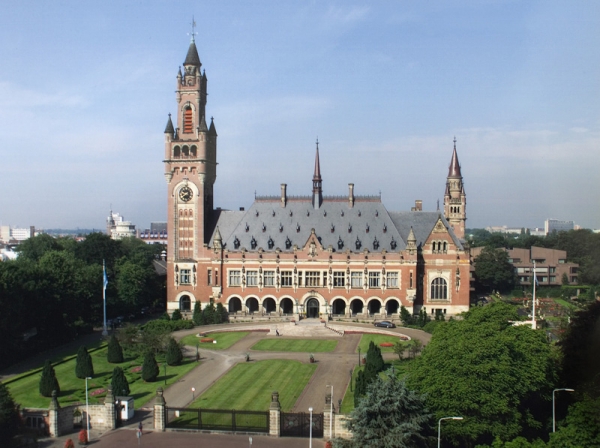1) International Court of Justice (ICJ)
Myanmar is to face accusations of genocide before the International Court of Justice (ICJ). The application, filed by The Gambia on 11 November 2019, is based on an alleged violation of the 1948 Convention on the Prevention and Punishment of the Crime of Genocide.
As Human Rights Watch (HRW) recalls, Myanmar has become a party to the Genocide Convention in 1956.The Convention allows Member States to bring a dispute before the International Court of Justice (ICJ), alleging another State’s breach of the convention. It also provides that States can seek provisional measures to stop continuing such violations.
According to The Gambia’s submission, in October 2016, Myanmar’s military began what it described as “clearance operations” against the Rohingya people. And, indeed, the same conclusion was reached in September 2019 by the United Nations-backed Independent International Fact-Finding Mission on Myanmar, which affirmed that “Myanmar is failing in its obligation to prevent genocide, to investigate genocide and to enact effective legislation criminalizing and punishing genocide.” The UN Human Rights Council has then established an Independent Investigative Mechanism for Myanmar, which is mandated to collect evidence of the most serious international crimes and prepare files for criminal prosecution. The International Criminal Court (ICC) prosecutor, Fatou Bensouda, has also sought to open an investigation for the crime against humanity of deportation and possibly other offenses, but a broader investigation would need a referral by the UN Security Council.
The submission will therefore bring the first judicial scrutiny of Myanmar’s campaign of murder, rape, arson, and other atrocities against Rohingya Muslims.
To know more, please read:
https://www.hrw.org/news/2019/11/11/gambia-brings-genocide-case-against-myanmar
https://www.hrw.org/world-report/2019/country-chapters/burma
2) Inter American Commission on Human Rights (IACHR)
The Inter-American Commission on Human Rights (IACHR) has been monitoring the situation in Venezuela closely since 2002. In its reports issued in 2003 and 2009, the IACHR expressed serious concern over the gradual deterioration of the human rights situation and democratic institutions. And indeed Venezuela has been included in the list of countries with the most concerning human rights situations in the Americas.
The crisis then began to worsen in 2016, to the point that, in 2017, the IACHR decided to operate a Rapid and Integrated Response Coordination Unit (SACROI). On the same year, the Commission also drafted a third country Report, entitled “Democratic Institutions, the Rule of Law, and Human Rights in Venezuela”. The document provides detailed, extensive documentation of the situation in Venezuela and analyses how the profound weakening of democratic institutions has impacted the Venezuelan population’s enjoyment of their human rights. It also documents the alarming increase in repression, torture, deaths at the hands of state agents, imprisonment for political reasons, violence, and citizen security, among other factors.
In connection with this dramatic situation, the IACHR has finally announced the creation of the Special Follow-Up Mechanism for Venezuela (MESEVE), to strengthen the use of its protection and monitoring mechanisms and respond in an effective, timely manner to the new challenges posed by the serious human rights crisis in the country. Specifically, MESEVE will be responsible for following up closely on the situation in the country, in order to evaluate requests for precautionary measures and follow-up on those that are granted; monitoring the human rights situation in the country closely through its different mechanisms and by reinforcing the capacities of these mechanisms; monitoring the situation of Venezuelan migrants on the ground in several countries in the region; systematically documenting human rights violations, following up on IACHR recommendations to the state, and helping to strengthen civil society organizations; and providing guidance, consultancy services, and information on the human rights situation in Venezuela as part of its role as a principal organ of the Organization of American States (OAS).
The rapporteur for Venezuela, Commissioner Francisco Eguiguren, explained that “as part of MESEVE’s work, the IACHR will draft two reports: one on the human rights situation in the country and another on the forced migration of Venezuelans.”
To know more, please read:
http://www.oas.org/en/iachr/media_center/PReleases/2019/267.asp
3) International Criminal Court (ICC)
Bosco Ntaganda, the former Congolese rebel leader whose cruelty and violence earned him the nickname the Terminator, has been sentenced to 30 years for war crimes and crimes against humanity.
As recalled by The Guardian, the Ntaganda was a key militia leader in DRC’s restive Ituri province in 2002 and 2003 and the first suspect ever to voluntarily surrender to the International Criminal Court (ICC) six years ago. He walked into the US embassy in the Rwandan capital, Kigali and asked to be sent to the court based in The Hague. Experts believe he gave himself up because he feared assassination after the collapse of the M23 movement, a rebel militia group which Ntaganda was accused of leading.
ICC Prosecutors focused on two specific attacks involving Ntaganda’s militia: the killing of 49 captured people in a banana field with “sticks, batons, knives and machetes”; and the violence erupted in 2008 that led to the death of at least other 150 people. On 07 November 2019, the ICC in The Hague convicted DRC warlord on 18 counts including murder, rape, sexual slavery and using child soldiers. The conviction for sexual slavery is the first in the ICC’s history.
To know more, please read:
https://www.bbc.com/news/world-africa-50329503
https://www.icc-cpi.int/Pages/item.aspx?name=pr1494




